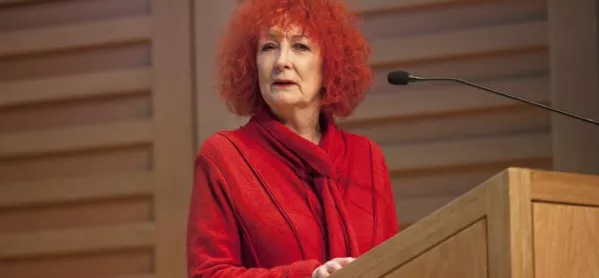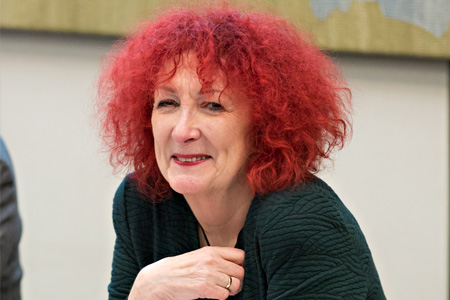Meet Ruth Silver: The grand Dame of further education

Dame Ruth Silver reflects on her first-ever teaching experience. As a teenager, she’d gained a National Union of Mineworkers scholarship to go to university, and the union asked what she could give back to the community.
“I wanted to share the gloss of learning with them. In Scotland, I grew up believing learning was more important than having money,” she says.
“There was a lovely coal miner who kept signing up for something every year and he had about eight Lowers. I said to him, ‘Are you going to use your Lowers to get to college or something?’ He said, ‘No, I want to keep learning because it gets you respected in the community.’”
Silver says she never had any intention of becoming a teacher, even after that experience. But her path led her to further education, and today it’s no exaggeration to say that she has become legendary. Immediately distinctive with a Scottish accent and fiery red hair, Silver is a gust of energy in any room.
Her CV is extensive: with her most notable role as the principal of Lewisham College for 17 years. Most recently, she’s been the president of the Further Education Trust for Leadership (FETL), which has published a plethora of FE research and theory papers. Last week, FETL officially closed after eight years - but at the age of 76, Silver has no intention of stepping quietly away from the world of FE.
FETL research: Almost half of leaders ‘experience distress regularly’
More by Ruth Silver: ‘Now is the time to plan FE leadership of the future’
FE Heroes: ‘Covid recovery is a major challenge for FE’
Silver was born in a small mining village in North Lanarkshire, Scotland. She was premature, and spent the first three months of her life in an incubator. Silver’s mother was a midwife, and her father was an engineer. Growing up, she remembers her family being very political - her grandfather and uncles had all been miners, and she remembers village life feeling “over-observed”.
“We had a big family, and lots of neighbours, and they all lived the same life. For my spirit, it was a bit over-observed and over-commented on. When I was a teenager, I remember thinking, ‘Oh my God, everyone knows your business,’ and them telling my uncle I was seen on a bus talking to a boy. It was a very small world, and very, very intimate. You were everybody’s child.”
As a child, Silver was an avid reader, and was the only girl in her village to pass the qualifying exam and go to grammar school. When she was 15, her father died, and the mining community gathered around the family. Without their support, and the subsequent scholarship she gained at 18, Silver says she would have never been able to go to university.
At the University of Glasgow, she studied English literature and psychology, and graduated with the hope of being a hospital almoner - a medical social worker. Silver says that while she had no desire to move to England, she knew she couldn’t stay in Scotland - “It was a very wee place” - and was given the opportunity to do some postgraduate work in Southampton with one of her old professors.
FE inspiration: Building a vocational curriculum
After a year in Southampton, she moved to London and worked at the Tavistock Clinic, before moving to the Woodberry Down child guidance centre. At the time, the school leaving age was raised to 16 and Silver remembers an influx of students at the centre, and school teachers “going crazy” because students were made to stay on in education, even though they had no desire to be at school - and crucially, no vocational curriculum to follow.
“The kids were made to stay at school, the teachers didn’t know how to handle kids who didn’t want to be there to do the theologies. They then got referred to the centre, and that made me think, ‘What’s going on?’” she says. “I started talking to the teachers and realised there was no curriculum for kids who didn’t want to go to university. So I started doing some bits of research.”
The research led Silver down an unexpected path: the civil service. Silver worked with Mike Tomlinson (known later for the Tomlinson report in 2005) designing curriculum and personal development programmes for the students who were vocationally minded. The work quickly became a full-time role in the further education unit in the government.
Silver says it was an amazing job: the Youth Training Scheme was established and, for the first time, there was a real focus on curriculum development, staff development and working with employers and the community on further education. Silver says she was “happy as Larry” because the doors to FE were truly open to her.
“I saw all these colleges, designing learning programmes for the first time. They didn’t have qualifications for the learning programmes, so the next thing was designing qualifications, and then it was about devising tests for competence,” she says.
“Once I opened the door and visited those communities, I thought, ‘This is where I want to be - where people come because they choose to come, not because they have to come.’ And for the first time, women were coming when the kids were at school to do courses in colleges.”

As a civil servant, Silver met Southwark College‘s then-principal John Bailey at a training course and applied for a head of faculty role at the college. It was Bailey, she says, who taught her to be a FE leader.
Becoming an FE college leader
“Principals teach other people how to be principals, so if you get really lucky, like I did, you get taught ways of thinking, you get your moral codes exposed and stretched, and high standards are expected,” she says. It was while she was at Southwark that Silver had her daughter, Martha, who she says grew up in the halls of the college.
“My husband would drive to meet me at the gate with her, and I could stay in work, I could have an hour playing with her. He’d go off and have a pint. I’d finish the day and get ready for the morning, while she learned to ride her bike in the corridors in Southwark. People were lovely with her, and the community wrapped around her,” she says.
After six years at Southwark, Silver moved to Newham College as vice-principal before getting the principal role at Lewisham College, where she stayed for 17 years. She went for the interview “as a practice”, and never thought she’d be given the job.
“I wasn’t a traditional woman. I never knew how to be suburban. Before me, they had only ever been engineers from polytechnics as principal, and I suddenly rolled up, the first woman not looking at all like an engineer,” she remembers.
She was given a temporary contract: Silver had just two years to turn the college around before the local authority shut it down. She worked hard, had ambitious plans, and won the hearts and minds of the staff and students - and the college remained open. Silver made a wealth of other connections: she became the chair of the board at the Working Men’s College, and used her relationships to further advantage her college. Visitors included Tony Blair and even the Queen.
Throughout her career, she has met the Queen on several occasions, including when she was awarded a CBE in 1998, and was made a Dame in 2006. She’s particularly proud of the latter, and remembers telling her daughter.
‘She’s a plucky Camden kid, and I said, ‘Guess what? The Queen is making me a dame!’ And she said, ‘Oh, how panto, mum,’” she laughs. “But a Damehood is the only honour women get for their work. Ladies either marry somebody who is a sir, or are the daughter of some viscount. Someone said to me, ‘A Damehood is the only award women get for their work,’ and I thought, ‘That’s it, then.’”
Under Silver’s leadership, Lewisham College went from strength to strength, and was rated “outstanding” by Ofsted. But by 2009, Silver felt it was time to retire, and allow the college to be moved forward by a new principal.
“I was 64, it felt the right time. If it hadn’t, I would have never left it: I would have scrubbed the floors, and, in fact, sometimes I did scrub the floors,” she says.
The importance of good endings
Retirement seems an inappropriate word for the next stage in Silver’s life. In the 20 years that followed, she contributed to the FE sector in a variety of roles: chair of the Learning and Skills Improvement Service, the co-chair of the Skills Commission, and chair of the A Blueprint for Fairness report, to name just a few.
But when she looks back on her career, Silver says it’s the ordinary moments that have touched her heart the most, the ones she’s most proud of: seeing a young black student proudly serve tea to the Queen and tear up afterwards because it meant so much, or walking into a shop and havint a former student approach her, keen to share their post-college successes.
It’s clear that FETL, too, is a source of immense pride.
“Terrifically, the British Library approached us and said, ‘We would love to archive your work,’ because they’d never come across an independent think tank for the FE sector. In fact, it’s because there hasn’t ever been one, except FETL,” she says.
“I’d phone people up and say, ‘What’s on your mind? Do you want to write about it?’ The response has just been wonderful because the idea of FETL was about informing the future, and our own people doing it, and not the government telling us what to do.”
And like Silver, FETL isn’t disappearing quietly: there will be a party in Westminster in June, she insists. As she puts it: “Good endings are the most important thing in love and life.”
You need a Tes subscription to read this article
Subscribe now to read this article and get other subscriber-only content:
- Unlimited access to all Tes magazine content
- Exclusive subscriber-only stories
- Award-winning email newsletters
Already a subscriber? Log in
You need a subscription to read this article
Subscribe now to read this article and get other subscriber-only content, including:
- Unlimited access to all Tes magazine content
- Exclusive subscriber-only stories
- Award-winning email newsletters